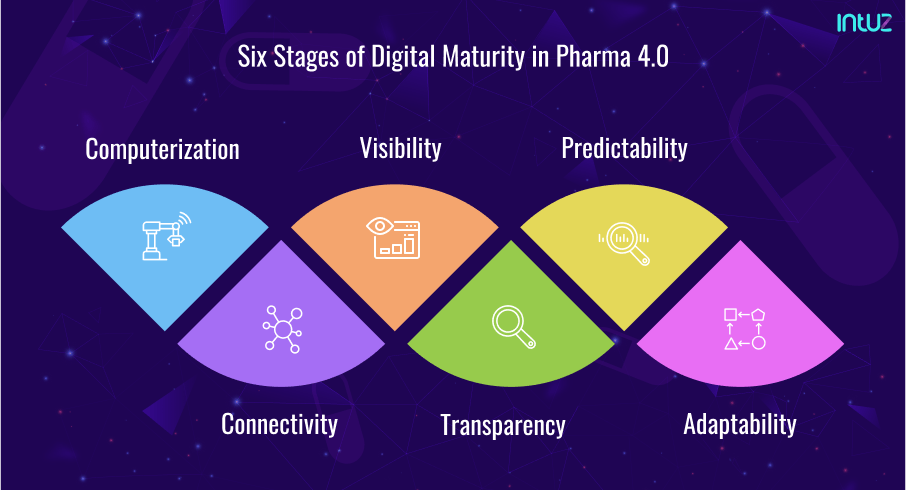Table of Content
Pharmaceutical manufacturers face many unique challenges in this remarkable era. While technological advancements have multiplied opportunities for process improvements, regulatory oversight has allowed adoption compared to other industries.
There are stringent requirements for documentation, process validation, and data integrity to create an environment where compliance outweighs continuous improvement.
However, the situation is not all dark and gloomy. The revolutionary new technologies of Industry 4.0, such as robotics, automation, and advanced analytics, have the potential to transform every aspect of a pharmaceutical manufacturing lab.
One can expect a significant change in this industry within the next five to ten years. In an efficient lab environment, real-life use cases have already delivered a 30% to 40% increase in the productivity levels of lab personnel.
A full range of improvements could reduce quality control costs by 50%. That is a significant reduction! Besides, speeding up problem resolution, digitization, and automation will reduce manual errors, enhance quality, and ensure compliance with the industry norms.
What is Pharma 4.0?
The future of pharmaceutical manufacturing is now more connected, agile, and efficient with the help of a new framework called 'Pharma 4.0.' It is a revolutionary approach to producing drugs and using data to resolve problems during production quickly.
Pharmaceutical manufacturers who are smart and quick to make decisions can put Pharma 4.0 to good use. The more tools they have to improve product quality and manufacturing efficiency, the better it is!
What is the story behind Pharma 4.0?
The International Society for Pharmaceutical Engineering envisions a digitally mature pharmaceutical industry by introducing a holistic plan. The organization coined the term Pharma 4.0 and outlined business and IT priorities throughout a drug's lifecycle.
The Society concurs that digitalization is a necessary step to stay competitive and agile. The plan helps companies leverage technology to achieve their goals by operating faster and reducing costs.
Pharma 4.0 intends to bring a cultural shift by driving processes towards more human-centric workflows. Connecting workers using digital technologies, the futuristic concept puts humans at the core of pharma manufacturing.
Enabling Pharma 4.0 through digital transformation
Digital transformation refers to the process of integrating digital technologies into all areas of a business that fundamentally changes how you operate and deliver value to the end customers.
It also drives a cultural change, compelling companies to challenge the status quo, experiment more often, and reach a certain level of comfort with failing (and trying again).
The pharmaceutical industry embraces change by shifting tasks to smart laboratories and factories powered by information systems. Critical data-sharing processes aid in quicker decision-making and real-time systems optimization.
Digital transformation in pharma manufacturing is inevitable. The industry uses automation to increase production rates and deliver higher precision while eliminating repetitive tasks. The latest in automation and robotics allow work to be performed faster and more accurately on a larger scale. These strategies enable engineers to focus on higher-value projects.
Robotic systems can be integrated with networked devices and smart sensor technologies to create sophisticated cyber-physical production environments for greater efficiency. The transition to Pharma 4.0 will shorten the time-to-market between product conception and delivery.
Ready for Pharma's Digital Transformation?
Let's Talk IoT IntegrationUse cases of Pharma 4.0
Pharma 4.0 promises a new era in manufacturing that helps bring about seamless integration in the system, resulting in high product quality and better patient outcomes. Here are the top use cases of pharma 4.0:
Use cases of Pharma 4.0
1. 100% digitalization
Real-time monitoring eliminates paper-based processes offering greater connectivity across departments and improving productivity. The implementation of digitalization in pharma manufacturing automatically ensures compliance. Pharma 4.0 principles must be incorporated holistically into the company's culture.
2. Better patient outcomes
The pharmaceutical industry is embracing new technology to stay ahead in an increasingly competitive market. The goal of digitizing manufacturing processes is to help companies achieve business goals through seamless technology integration. Delivering high product quality will lead to better patient outcomes.
3. Greater delivery reliability
Pharma manufacturers are taking advantage of connected factories to reduce costs. Experts estimate 20% or more savings through digitalization even while improving quality and ensuring reliable delivery. A bifurcation shows a 17% reduction in costs incurred due to poor quality, a 15% decline in manufacturing costs, and an increase of 14% in delivery reliability.
4. End-to-end production overview
Pharma 4.0 offers many digital capabilities, such as remote manufacturing equipment monitoring and predictive maintenance. Manufacturing inefficiencies can be identified to avoid batch failures. It follows a holistic approach - from facilitating raw material selection to reducing process variations.
5. Connected people, processes, and technology
Industrial Internet of Things (IIoT) and Cyber-Physical Systems (CPS) are helping enhance connectivity and improve productivity by bringing together humans and pharma technology. The IoT network brings humans, machines, and sensors together while modeling the physical world. It acknowledges human involvement in quality control, equipment maintenance, data interpretation, and last-mile assembly.
Six stages of digital maturity in Pharma 4.0
The stages outline a path that all pharmaceutical manufacturers can follow to transform their company and make it more efficient. The least mature stage is elementary computerization, while the most developed stage revolves around self-regulating intelligent facilities. Let us dive deep into all the stages:

1. Computerization
The first step of digital maturity is to automate simple manual processes to find repetitive tasks and use computers to perform them. It creates a foundation for future innovation in digital infrastructure.
2. Connectivity
The next stage is expanding the IT infrastructure to support a seamless flow of information among manufacturing, IT, and business functions.
3. Visibility
Moving on to a data-driven decision-making process will help pharmaceutical manufacturers improve substantially. They will be able to create a digital production record through connected people, machines, and processes to make real-time decisions using data.
4. Transparency
Data lets you see the manufacturing function from a new perspective. Advanced analytics offers insights into complex systems and opportunities for improvement.
5. Predictability
Pharmaceutical manufacturers can use detailed production records to identify and rectify problems before they happen. This saves time and money for the manufacturing plants.
6. Adaptability
The final stage of digital maturity is adaptability, as the systems anticipate problems and take proper action. The digital solutions in pharma can continue functioning efficiently through advanced technologies such as AI and ML.
Top trends of Pharma 4.0 you should know
The pharmaceutical sector has always been at the forefront of innovation, and with the digital transformation, it is benefiting from more significant opportunities. Companies already driven by Pharma 4.0 are quickly following the below-mentioned trends:
Top trends of Pharma 4.0
1. Low volume production
The pharmaceutical industry is shifting from producing drugs for the masses to high-value treatments. Low-volume production of drugs is one of the major causes behind this industry-wide shift.
Manufacturing life-saving drugs in low volumes complicates the manufacturing process as the latter is just as rigorous and time-consuming as the mass production workflows. Low volume production faces challenges because there are fewer batches for GMP validation, and supply chains are shorter.
Pharmaceutical manufacturers must set up faster production lines, accurately collect batch data, and respond to fluctuating product demands to maximize profits. Pharma 4.0 ensures that conveniently.
2. Personalized medicine
Precision medicine (or personalized medicine) is a term used for treatments tailored to an individual's predicted response to medication. It is based on previously done clinical trials and the patient's genetic information. These medicines are already available in the market, which indicates the rise in their consumption.
The production of precision therapies is expected to increase by 33% in the next five years, with the demand for personalized medicine having doubled in the last five years.
The implications of personalization for pharmaceutical manufacturers are significant as they must prepare their production schedules to meet made-to-order requirements. These measures will require smaller specialized facilities that can produce more efficient customized products.
3. Pre-production training
The pharma manufacturing industry has faced a major challenge in training its employees. With increasing regulations, finding new ways for people to learn complicated tasks quickly and efficiently is essential.
Switching to digital applications will help pharmaceutical manufacturers train their workforce effectively at a lower cost. The entire process can be converted into digestible modules for faster learning and retention.
You can simulate even fundamental production processes to train workers in life-like working scenarios. These applications will collect data and allow employers to take corrective actions for improved training efficiency.
4. Continuous manufacturing
Pharma manufacturing is shifting from batch production to continuous manufacturing. Roots Analysis conducted a study on this manufacturing technology, which showed that the technology could reduce manufacturing costs by 15-30% while bringing down workforce costs by 50-70%.
It also reported 40% less power consumption, reduced footprint by 50-70%, and reduced product deviation to 50%. Even though continuous manufacturing is still an emerging technology, it is estimated to help scale up pharma manufacturing. The continuous manufacturing market is estimated to expand at 14% per year by 2027.
5. Increase in cloud adoption
Pharmaceutical manufacturers are inclined to adopt cloud technologies for data storage and security. Cloud infrastructure helps ensure data integrity while ensuring that information flows seamlessly across a product's lifecycle. It helps optimize processes and reduce costs in areas such as distribution or maintenance.
Another trend is adopting Platform as a Service (PaaS) offerings. Manufacturers can use them for healthcare app development. They can build, configure, and iterate GxP-compliant applications in tightly-controlled environments. Who would not want that?
6. Big Data for predictive measures
ISPE's Pharma 4.0 maturity model focuses on smart drug production facilities as an end goal of digitization. With these upcoming changes in pharma technology, manufacturing systems must be able to quickly respond to demand fluctuations and implement corrective actions to be truly smart.
For predictive quality measures, the facility must process large data sets accurately and provide production insights using AI and machine learning.
The first step to building predictive algorithms is articulating the questions you want the system to answer. Next, you must install sensors on checkpoints along production lines to capture valuable information about the manufacturing process.
7. Single-use technologies and facilities
The cost of opening large-scale production facilities remains high, which makes it difficult for pharmaceutical manufacturers to expand their operations. However, single-use facilities and technologies are providing low-cost pre-clinical and clinical manufacturing solutions.
These require minimal investment to generate revenue and help save costs. Single-use facilities cost less while offering more capabilities than traditional ones. They can manufacture multiple products using disposable technology in place of stainless steel equipment.
8. Digitization of paper processes and documentation
The transition to a paperless world is happening much quicker than we realize, with pharmaceutical manufacturers being early adopters of paperless processes. By implementing new technologies such as AI and IIoT in tandem with their existing systems for record-keeping, they can maximize efficiency while improving visibility on all levels.
The digitalization of pharmaceutical processes is a significant trend that can help companies reduce costs, eliminate errors, and improve efficiency.
Data loss in paper-based systems is eliminated with the use of digital records. Compliance and record-keeping are performed seamlessly along the manufacturing process. Digital history record applications allow retrieving data - as and when needed - a hassle-free task!
IoT In Hospitality: Changing The Industry's Face Post-Pandemic
Learn MoreBenefits of Pharma 4.0
The transition to Pharma 4.0 is a critical decision point for any company looking for digital solutions powered by the latest digital technologies. The benefits of Pharma 4.0 are:
1. Workforce benefits
- Reduced monotony to foster innovative thinking
- Better working conditions and improved performance
- Elimination of paper-based records to deliver high-value work
- Reduced stress with end-to-end manufacturing process monitoring
- Personal performance data recorded and used for better people management
2. Complexity management
- Data is safely recorded for troubleshooting and future use.
- A higher level of GMP application through AI-driven decision-making is achieved.
- Predictive analytics and ML functions can be leveraged for smarter maintenance and reduced bottlenecks.
3. Holistic control strategy
- The manufacturing process is continuously monitored for quality risk and knowledge management.
- Risk levels are decreased, quality levels are increased, and time to market is reduced.
- Resolution of supply chain issues by breaking silos and information sharing.
- The satisfaction of ICH Q10 PQS guidelines is guaranteed.
4. Manufacturing optimization
- Pharma Lean Six Sigma maximizes performance.
- Streamlined digital workflows enable efficient production loops, better communication, and faster decision-making.
- Reduced manufacturing costs and timely order delivery are other benefits. Minimal deviation from drug recipes and other contractual obligations is a given.
Upgrade to Pharma 4.0: Let's Design Your Smart Pharmaceutical Facility!
Explore SolutionsThe future of the pharmaceutical industry
There are multiple benefits of adopting Pharma 4.0 for companies dealing in drug manufacturing and life sciences. However, shifting to the Pharma 4.0 model requires operational changes. You must reimagine everything - from the workforce's mentality to pharma manufacturing processes and infrastructure. It will help you achieve the highest levels of production quality.
The pharmaceutical industry is still in the early stages of automation. However, there are many ways pharmaceutical manufacturers can make their facilities more efficient with a digital transformation strategy.
The roadmap for transformation starts with finding the opportunities in the current facility as well as scaling it up. The pace of change for pharmaceutical manufacturers has been faster than ever before. To keep up with this rapid shift, companies need agile but flexible healthcare mobile app development that can adapt quickly and effectively to their unique needs.
If you want to build a solution that will aid you in this endeavor, look no further. Our development experts have worked on numerous projects in the pharma industry and have the right skill set to deliver a software solution that stands the test of time. Waste no time -
Book your 45-minute free consultation with our IoT experts today and get a free roadmap or strategies for IoT integration for your pharmaceutical business.





